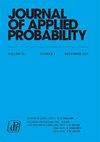制度转换模型下的受限最优停机
IF 0.7
4区 数学
Q3 STATISTICS & PROBABILITY
引用次数: 0
摘要
我们研究了制度切换几何布朗运动的贴现报酬期望值的最优停止问题,该问题对可能的停止时间有两个限制:只能在外生性随机时间停止,以及只能在特定制度期间停止。我们的主要目标是证明最佳停止时间作为阈值类型存在,并推导出价值函数和最佳阈值的表达式。为此,我们求解了相应的变分不等式,并证明其解与价值函数重合。我们还介绍了一些数值结果。此外,我们还研究了一些渐近行为。本文章由计算机程序翻译,如有差异,请以英文原文为准。
Constrained optimal stopping under a regime-switching model
We investigate an optimal stopping problem for the expected value of a discounted payoff on a regime-switching geometric Brownian motion under two constraints on the possible stopping times: only at exogenous random times, and only during a specific regime. The main objectives are to show that an optimal stopping time exists as a threshold type and to derive expressions for the value functions and the optimal threshold. To this end, we solve the corresponding variational inequality and show that its solution coincides with the value functions. Some numerical results are also introduced. Furthermore, we investigate some asymptotic behaviors.
求助全文
通过发布文献求助,成功后即可免费获取论文全文。
去求助
来源期刊

Journal of Applied Probability
数学-统计学与概率论
CiteScore
1.50
自引率
10.00%
发文量
92
审稿时长
6-12 weeks
期刊介绍:
Journal of Applied Probability is the oldest journal devoted to the publication of research in the field of applied probability. It is an international journal published by the Applied Probability Trust, and it serves as a companion publication to the Advances in Applied Probability. Its wide audience includes leading researchers across the entire spectrum of applied probability, including biosciences applications, operations research, telecommunications, computer science, engineering, epidemiology, financial mathematics, the physical and social sciences, and any field where stochastic modeling is used.
A submission to Applied Probability represents a submission that may, at the Editor-in-Chief’s discretion, appear in either the Journal of Applied Probability or the Advances in Applied Probability. Typically, shorter papers appear in the Journal, with longer contributions appearing in the Advances.
 求助内容:
求助内容: 应助结果提醒方式:
应助结果提醒方式:


